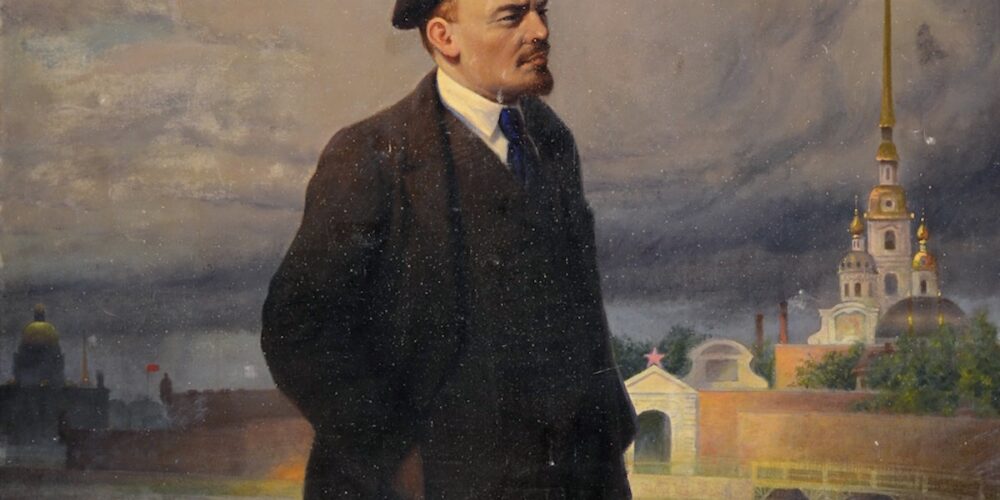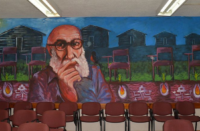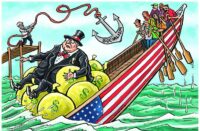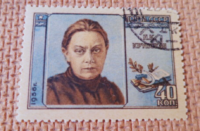A hundred years have passed since the death of Lenin, the name used by Vladimir Ilyich Ulyanov since 1901. A hundred years is not a long period in historical sense, but a lot of water has flowed under the bridge in the meantime. The Russian Revolution, anti-colonial struggles, the rise of the Soviet Union, the Second World War, the defeat of Nazism and fascism, the spread of revolution to many Third World countries, the Cold War, the dilution of revolutionary principles and the fall of the Soviet Union, neo-liberalism, climate catastrophe due to capitalism: the world has witnessed it all.
Looking back, what has been the impact of the Russian Revolution on the lives of the working class and oppressed people? How did it influence anti-colonial struggles, women’s empowerment, equality, etc.? How could a country which was the sick man of Europe transform into an economic superpower in a few decades after the revolution? What was Lenin’s contribution in enriching Marxism according to the concrete realities of the changing world? We will recognize the genius of Lenin when we try to find answers to these questions.
“Without a revolutionary theory, there can be no revolutionary movement”, is a famous quote from Lenin’s What Is To Be Done (1902)? But a revolutionary theory is useless unless there is an organisation to put that theory into practice. A party based on specific principles is needed to radically change the way the society functions. The genius of Lenin lies in the formulating of a party organized on the principles of democratic centralism.
Lenin said: “The Marxist theory is neither completed, nor inviolable”. Capitalism is a system which evolves at a rapid pace, hence the critique of capitalism has to be updated to explain the changing world. During the time of Lenin, capitalism reached a stage where not just commodities but capital was exported to exploit labour power and natural resources, the two main ingredients of an expanding capitalist mode of production. More countries had to be brought under the yoke of capitalism, and thus began the scramble for colonies. The theory of imperialism is another great contribution of Lenin towards expanding the science of Marxism.
Marx and Engels initially wrote that revolution was only possible in advanced capitalist countries like England or Germany where there is a large working class, though they later indicated a possibility of a revolution in less developed countries. Lenin invented the theory that a snap at the weakest link in capitalism is possible by creating the worker-peasant alliance which was put into practice with the successful revolution in Russia.
Lenin was also a genius in creating the right slogans for specific stages of the revolution. For the February bourgeois democratic revolution, Bolsheviks called for “Confiscation of the Landed Estates”, the “Democratic Republic”, and the “Eight-Hour Day”, and for the October revolution it was the slogan, “Peace, Land and Bread”.
Lenin also understood the mistakes of Paris Commune which Marx had analysed. Lenin had the clarity to understand that a working class revolution like the Paris Commune (1871) could last only a few months since it used the same state apparatus, instead of a radical overhaul needed to avoid counter-revolution. Lenin believed a revolutionary party cannot be called so if it is not willing to take the power. Lenin also urged the Bolsheviks to take power from the bourgeois Kerensky government (which came to power in February 1917 after the overthrow of the Czar’s regime). Lenin warned that If the Bolsheviks were reluctant it will lead to anarchy which will go beyond their control. That was again Lenin’s masterstroke.
The other great contribution of Lenin was to protect the revolution in Russia when revolutions in other European countries like Germany did not happen as expected. During this time, Russia was attacked by capitalist countries, beset by internal civil war, insurgencies, poverty and counter-revolutions.
Any revolution creates reverberations across the world. The French Revolution (1789) created Jacobin moments in England, Ireland (1798) and even far-away Haiti (1799) which was a French colony. The ideals of Liberty, Equality and Fraternity spread far and wide. But the impact of the Russian Revolution was unimaginable compared to any previous revolutions, because it tried to create a classless society, a world where a human being is not exploited by another.
This was a concept without any precedent because all previous revolutions just changed the form of exploitation but there remained exploiters and the exploited. Hence Russian revolution gave hope to colonial countries to shrug off the chains of slavery and believe that the working class can come to power. Communist parties were formed in many countries across the world in the 1920s.
Lenin’s revolutionary life is mind-boggling, no more so in that he studied and wrote so much, including on the latest developments in science, in spite of being in exile and constantly shunting from one place to other in disguise to avoid Czarist repression.
This is a poem by Langston Hughes, an African-American poet on comrade Lenin:
Lenin walks around the world.
Frontiers cannot bar him.
Neither barracks nor barricades impede.
Nor does barbed wire scar him.
Lenin walks around the world.
Black, brown, and white receive him.
Language is no barrier.
The strangest tongues believe him.
Lenin walks around the world.
The sun sets like a scar.
Between the darkness and the dawn
There rises a red star.






